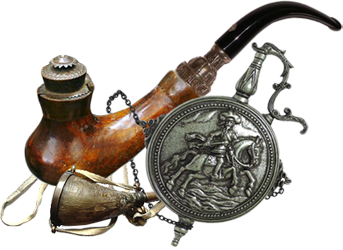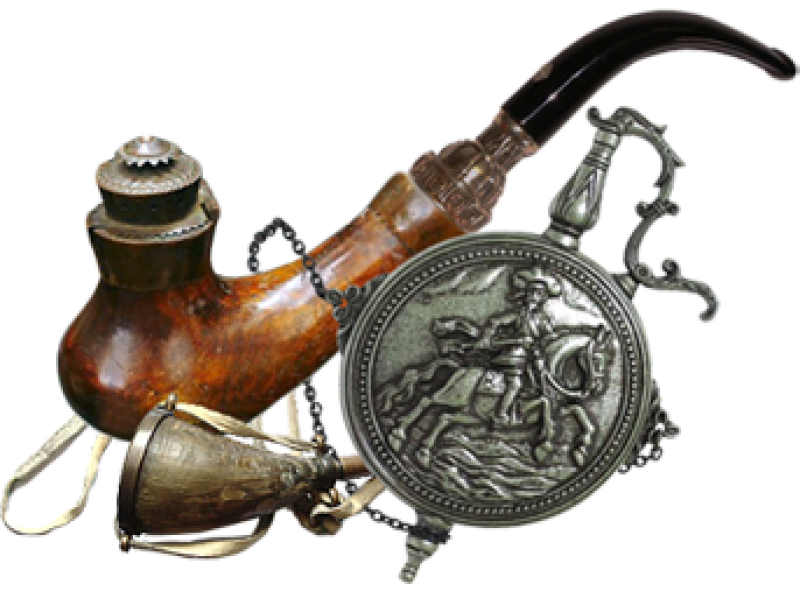 Cossacks did not often deny themselves entertainment: vodka, mead, and especially a pipe. What is the value of Gogol's description of Taras Bulba, when he was looking for his damned pipe? Interestingly, this image is not fictional, but created based on a real prototype. Also, the testimonies of foreigners who were lucky enough to visit the Sich confirm the Cossacks' passion for tobacco.
Cossacks did not often deny themselves entertainment: vodka, mead, and especially a pipe. What is the value of Gogol's description of Taras Bulba, when he was looking for his damned pipe? Interestingly, this image is not fictional, but created based on a real prototype. Also, the testimonies of foreigners who were lucky enough to visit the Sich confirm the Cossacks' passion for tobacco.
But, strangely enough, the general epidemic of smoking did not lead to the lung diseases that are common in our time. Apparently, this disadvantage was neutralized by a healthy way of life and everyday life. Unlike today.
It would seem that what else can you smoke besides tobacco? But there are researchers who know that you can also stuff a tasty male toy with herbs.
One of the researchers of this phenomenon was Anatoly Pasternak, who wrote the book "Cossack Medicine" (published in 2001). So, he says that tobacco in those days was expensive for everyday use, so our native herbs were added to a small amount of it, which had healing properties: they improved sleep, digestion, and softened the effect of the environment on the nervous system. Among these herbs, the researcher believes, were mint, oregano, wormwood, oak, thorn and many other, no less interesting, components.
 Each of these herbs had its own properties. For example, oregano was calming.
Each of these herbs had its own properties. For example, oregano was calming.
Mint added a pleasant smell to the mixture, so it was often mixed into snuff.
Gentian relieved joint pain.
Turmeric, especially its leaves, was very effective in purifying the blood in wounds. It was also called Antony's fire at that time.
Sawdust was especially loved by the watchmen because it enhanced their eyesight.
Wormwood destroyed the dark thoughts in the Cossack's head.
The witch-herb gave the Cossacks confidence because it had the effect of a light drug.
Holly had an antiseptic effect.
The burkun was added to forget all the bad events of the last battle, and also as a remedy for rheumatism.
 The young ladies also knew what and how to apply to get the desired result: it was worth adding lovage to the tobacco of the chosen one, as the Cossack began to look with interest in the direction of that young lady, and love blossomed in a lush bloom. And the more practical effect of lovage was in its antiseptic properties and as a means of removing tumors.
The young ladies also knew what and how to apply to get the desired result: it was worth adding lovage to the tobacco of the chosen one, as the Cossack began to look with interest in the direction of that young lady, and love blossomed in a lush bloom. And the more practical effect of lovage was in its antiseptic properties and as a means of removing tumors.
Now we see that the Cossack pipe never saw pure tobacco.
If we look at the wort, we can see how interesting this herb can be. It reduced the symptoms of cramps when cold, so fishermen also used it when they went on a journey. There was also a side effect - the occurrence of delusions and hallucinations.
But the Cossacks knew about this. Perhaps it was because of this knowledge that they smoked before battle, to feel lightness, desperation, not feel pain so acutely, and generally be more militant.
And tobacco itself, like its name, came to us from Turkey, where it is called. It was the Turks who had a hand in important trade routes in the Mediterranean Sea, just at the time of the appearance of tobacco in Europe. It is not known whether merchant ships or military personnel brought it, because it could have been on both. And it is more likely that it was the Ottomans who adapted this Spanish fad and brought it to our lands.
 The Cossacks not only adopted the habit of smoking, but also sowed the seeds for future enjoyment.
The Cossacks not only adopted the habit of smoking, but also sowed the seeds for future enjoyment.
But habit is a habit, and the culture of smoking has developed among our men. The Cossacks never smoked in the hut, or in the kuren, or even in the dugout. They recognized that God was there, so it was not allowed. Icons hung there. And that is why the smoke did not accumulate in a closed room and did not eat away the eyes and lungs.
And when you want to light up, there is so much fresh air outside, and it turned out that the Cossacks spent most of their time outside. Starting from early spring and ending in deep autumn, they even slept outside. They kept tobacco in small pumpkin pots, called tubs, turchanki, and over time the tobacco-herb mixture in them became stronger and harder, but was always dry and did not mold. It is not comparable to modern cigarettes and cigarettes. In addition, the pipe often went out, and the Cossack had time to think: did he burn too much? It is very convenient for both health and the pumpkin pot.
But those are all conditions, but the tobacco itself – it held half the mystery. The original Turkish was not always available because of its high cost, so it was not always purchased for money. There was also the case that the saber helped to get rid of the shortage, or the thresholds through which without duty – in this case tobacco – one could not pass.
So it started, with tobacco in very small quantities, and the rest being all our own, rare herbs: yarrow, thyme, wormwood, mint, even thistle.
And considering the beneficial effects of various herbs, especially in mixtures, it turned out that smoking performed a therapeutic function for the Cossacks. We can say that the courage and intelligence of the warriors depended on smoking, as did immunity to various asthma, bronchitis, etc.
It is probably possible to note that there were enough harmful substances left in the smoke. But here too, there is a way out: after all, it is smoke that treats many diseases, and it is through the mucous membrane of the bronchi and nose that the necessary substances are better absorbed. Homeopathy itself testifies to this, and scientific medicine does not deny it.
 Some peoples use smoke to treat all their illnesses, and this has been confirmed by time and researchers.
Some peoples use smoke to treat all their illnesses, and this has been confirmed by time and researchers.
Thus, it turns out that smoking was not only a form of entertainment for the Cossacks and a pleasant pastime, but also a form of treatment. Virtually no negative consequences, only benefits!
It would be good for our smokers today to remember respect for the home and others in their excessive enthusiasm, but not a useful, but a very painful habit. And perhaps doctors should also apply grandfather's methods of combating drug addiction and substance abuse.
Neighborhood with the Tatars and Ottomans allowed us to give something and borrow something – from everyday life, habits, and life.
The Cossack scout, for example, looked like a Basurman: a shaved head and red trousers, which was not his. And by the time they would examine him, and by the time they would realize that something was wrong, the Cossack would have disappeared. And when the Polish soldiers saw him, they would be afraid to touch him: what if there was an entire Ottoman army behind that lone Turk?
But foreign habits and manners were not always so useful. The same smoking - from the Ottomans. Or vice versa - the habit of drinking alcohol came to our neighbors from the Cossacks. And the Janissaries were not stupid to drink.
And against this background, for some reason, neither drug addiction nor opium smoking took root. An interesting question is why?
Ethnographers have their own version: the peculiarities of the Ukrainian mentality, strong traditions, and stubbornness were inherent in the people. When hashish and other poisonous potions were popular in the East, the Cossacks had another opportunity to relax and rest - with beers and meads. In addition, the Cossack had to be constantly on the alert, in a healthy and sober state. The example of neighbors gave the opportunity to draw their own conclusions and not abuse too much - after all, behind them was the homeland and family.
 Unfortunately, today we see that there is no more stubbornness in men, no more resistance to addiction than there was before.
Unfortunately, today we see that there is no more stubbornness in men, no more resistance to addiction than there was before.
Doctors and medical professionals have another version, more practical, a kind of hypothesis of immunization from childhood. Cossack ranks consisted mostly of peasant children. And they were fed by peasant women until almost two years old, sometimes even more. There were no wet nurses who raised the child, but were not blood relatives to her. These were the whims of young ladies and wealthy women, and ordinary peasants could not afford such things. Thus, the child did not have psychological trauma due to separation from the mother and transfer of it into foreign hands, no matter how gentle they were. And in addition, the child was protected for a longer time by the immune bodies of mother's milk, which saved it from many diseases and infections, including nervous ones. And the child's own defense system could calmly form.
There is also such a version, very unusual and controversial, but one that has the right to exist. During the harvest, peasant women could not take care of their child all the time, so they invented such a substitute - instead of breast milk, a mixture of poppy milk with bread crumbs, wrapped in a clean piece of cloth. A kind of pacifier. However, it should be remembered that poppy milk is not the juice of green plants, but poppy seeds, ground with water and honey.
 Supporters of the women's movement, socialists saw in such actions of peasant women the result of oppression by the lords. They say, it was because of them that poor women were forced to abuse their children. But women listened and did, as has been the case since time immemorial. And the child slept soundly and healthily, and there were almost no frights among the infants. So there was no need for the relative to castrate. Later, zemstvo doctors and statisticians also noticed that in Ukrainian villages the proportion of nervous children and adolescents or mentally ill people was the smallest.
Supporters of the women's movement, socialists saw in such actions of peasant women the result of oppression by the lords. They say, it was because of them that poor women were forced to abuse their children. But women listened and did, as has been the case since time immemorial. And the child slept soundly and healthily, and there were almost no frights among the infants. So there was no need for the relative to castrate. Later, zemstvo doctors and statisticians also noticed that in Ukrainian villages the proportion of nervous children and adolescents or mentally ill people was the smallest.
And what surprised admirers of the people the most was that wealthy Ukrainian families, already free from serfdom and serfdom, of their own free will and without violence, continue to give their young children that "nanny" with a poppy.
So the liberals were forced to close the topic. And the last reason for this was the observations of field surgeons. They noticed that among the large number of wounded soldiers and officers, the majority of the wounded tolerated nitrous oxide (the so-called “laughing gas”) well, but did not tolerate chloroform or ether well. And one of M.I. Pirogov’s students, who operated on the soldiers, doctor Chepraga, noticed that all the wounded who could not tolerate it were Ukrainians.
The same thing was observed when morphine, opium, cocaine, etc. were already widely used in medicine. Basic anesthesia caused a violent reaction of the body in Ukrainian soldiers. And although the suffering from wounds was severe, the soldiers refused drugs and their sedative effect and did not acquire this harmful habit of constant drug use in the future. Didn't the "nanny" help them in this?..


Write a comment